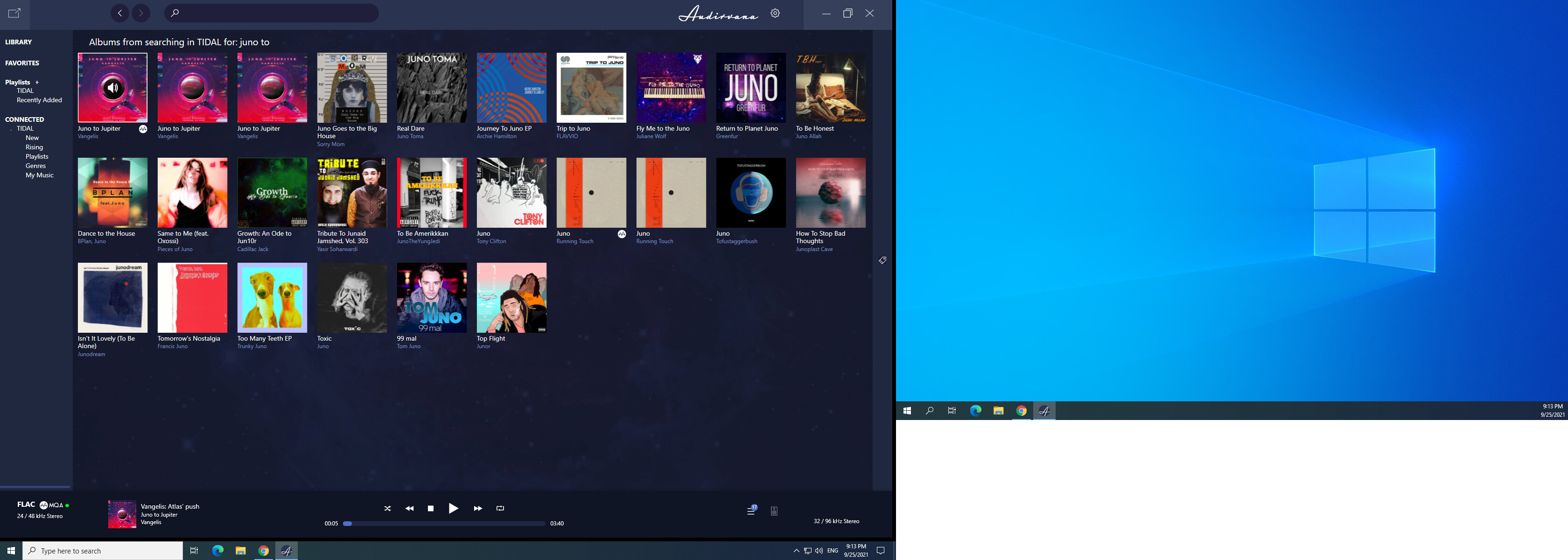

- #AUDIRVANA PLUS 3 VS JRIVER SOFTWARE#
- #AUDIRVANA PLUS 3 VS JRIVER CODE#
- #AUDIRVANA PLUS 3 VS JRIVER WINDOWS#
Neither the player, not for Windows nor if I went with a linux/pi based system, seems perfect to me (no interest in Apple).
#AUDIRVANA PLUS 3 VS JRIVER SOFTWARE#
All with a pretty, fast graphical interface from a company providing great documentation and support in the form of good, up to date software improvements (since these platforms are really a moving target at the moment). On the software side, I want a piece of client software I can buy once, not software as a service, that integrates Qobuz and other streaming services with my local library, and works seamlessly and interoperably with any USB DAC or client/player software and if not natively integrating Qobuz at least implementing some kind of bulletproof DNLA arrangement both for the server and the control software.

On the hardware side the options for the features and price (Allo USBridge, SOTM-200, Sonore Microrendu) seem to be more available than on the software side. I'd think about spending more for a lot more computing power if it could do realtime DSD upsampling, because with my DAC's AKM chip, the DSD handling sounds particularly good, but not for features I won't use (don't need a DAC, don't need storage, don't need multiroom capability), but for the time being I really just need a $500 network bridge. I want a network bridge piece of hardware to transport the network signal to a USB DAC at $1K or preferably significantly less, mostly to stream music from Qobuz but occasionally to play a local file (not from a dedicated server but from a networked laptop), without having to hook and unhook my laptop to my DAC all the time, supporting files up to DSD256. I'm actually pretty clear on what I want and why. I've been finding it all pretty much clunky, complex, not always so stable, often hard to use, with few pieces offering all the features, and those that do, being very costly (and I hesitate to put a lot of money into that stuff today, not just because it's a financial stretch for me but also because the tech continues to be moving so quickly I'm loathe to spend a lot of money today on something that will be next to obsolete tomorrow). I've been playing around with UPnP server software.

I've tried Audirvana, JRiver, Foobar, HQ Player, others too over the years, and of course all the client software of the streaming services. I've also tried lots of different software on the client/player side - because I'm not at all interested in paying a subscription fee for the client software, so Roon is a non-starter for me. I've been investigating configuring my own device with a fanless NUC because I can't seem to find what I want at a price I can afford with easy interoperability and support. I've been reading the forums and reviews at the former Computer Audiophile. The best I'm aware of based on testimonials is Aurender's Conductor.Ĭlick to expand.Well, I'm actually pretty familiar with the range of products that are out there, because I've been looking for a couple of years, since I've gone all in on streaming services, for an easy to configure, plug-and-play, USB network bridge type streaming device that is easily configurable, and interoperable across platforms at a price I can afford. NAD uses BluOS, for example, but I'd guess that many end up with a Roon subscription. There are few proprietary solutions that beat Roon all-around. I'd get Roon just as the author mentions and as I've done with the Cary. I would buy a Rossini for the power supply and analog stage design in addition to their proprietary D/A conversion and not for rendering or library management. The article relates this using dCS Rossini as an example. So, I'm not using Cary's own rendering solution or music library management software.
#AUDIRVANA PLUS 3 VS JRIVER CODE#
The ethernet out from my customized NUC connects to my Cary Audio DMS-700 where Roon's software development kit has been implemented (includes endpoint code and RAAT). I have 16 GB RAM (2x8) and a 4TB SATA SSD for my WAV and, eventually, DSF files. Roon Optimized Core Kit (ROCK), which was developed with Linux, sits on an M.2 SSD. I'm using an Intel NUC as a music server. Brief network audio explainer within the context of Roon ( LINK).


 0 kommentar(er)
0 kommentar(er)
